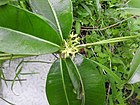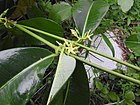Note: This is a project under development. The articles on this wiki are just being initiated and broadly incomplete. You can Help creating new pages.
Difference between revisions of "Cryptolepis buchanani"
(→References) |
(→References) |
||
| Line 68: | Line 68: | ||
</ref> | </ref> | ||
<ref name="How to plant/cultivate">[https://vikaspedia.in/agriculture/crop-production/package-of-practices/medicinal-and-aromatic-plants/cryptolepis-buchananii-1 Cultivation]</ref> | <ref name="How to plant/cultivate">[https://vikaspedia.in/agriculture/crop-production/package-of-practices/medicinal-and-aromatic-plants/cryptolepis-buchananii-1 Cultivation]</ref> | ||
| − | <ref name=" | + | <ref name="Uses">Karnataka Medicinal Plants Volume - 2 by Dr.M. R. Gurudeva, Page No. 587</ref> |
</references> | </references> | ||
Revision as of 17:48, 26 August 2021
Cryptolepis buchanani is much branched, Large climbing shrub. Purplish red when young peeling off in papery flakes and It will become brown when old.
Contents
- 1 Uses
- 2 Parts Used
- 3 Chemical Composition
- 4 Common names
- 5 Properties
- 6 Habit
- 7 Identification
- 8 List of Ayurvedic medicine in which the herb is used
- 9 Where to get the saplings
- 10 Mode of Propagation
- 11 How to plant/cultivate
- 12 Commonly seen growing in areas
- 13 Photo Gallery
- 14 References
- 15 External Links
Uses
Appetitis, Fever, Skin diseases, Leprosy, Rickets[1]
Parts Used
Chemical Composition
Common names
| Language | Common name |
|---|---|
| Kannada | Medhagulihambu |
| Hindi | Karanta |
| Malayalam | Kattupalvalli |
| Tamil | Paalkodi |
| Telugu | Adavipaalatige |
| Marathi | |
| Gujarathi | |
| Punjabi | |
| Kashmiri | |
| Sanskrit | Krishna sariva |
| English | Indian Sarsaparilla |
Properties
Reference: Dravya - Substance, Rasa - Taste, Guna - Qualities, Veerya - Potency, Vipaka - Post-digesion effect, Karma - Pharmacological activity, Prabhava - Therepeutics.
Dravya
Rasa
Guna
Veerya
Vipaka
Karma
Prabhava
Habit
[[:Category:Habit - |]]
Identification
Leaf
| Kind | Shape | Feature |
|---|---|---|
| Elliptic, Oblong or oblong – Lanceolate | Acute or Acuminate | Leaves are 7.5 – 12.5 cm X 3.8 – 6.3 cm in size, green above and whitish beneath |
Flower
| Type | Size | Color and composition | Stamen | More information |
|---|---|---|---|---|
| Ovate-lanceolate with scarious margins | Greenish yellow or Yellow white | Flowering season is December to May |
Fruit
| Type | Size | Mass | Appearance | Seeds | More information |
|---|---|---|---|---|---|
| Follicle | 2.5-10 cm long | Seeds are 0.5 cm long in size, ovate-oblong, compressed and black in colour | Fruiting season is December to May |
Other features
List of Ayurvedic medicine in which the herb is used
Where to get the saplings
Mode of Propagation
How to plant/cultivate
The crop prefers well-drained sandy-loam acidic soils with abundant organic matter (4.5 to 6.0).[4]
Commonly seen growing in areas
[[:Category:Herbs that are commonly seen in the region of |]], [[:Category:Herbs that are commonly seen in the region of |]], [[:Category:Herbs that are commonly seen in the region of |]], [[:Category:Herbs that are commonly seen in the region of |]], [[:Category:Herbs that are commonly seen in the region of |]].
Photo Gallery
References
- ↑ Karnataka Medicinal Plants Volume - 2 by Dr.M. R. Gurudeva, Page No. 587
- ↑ [Chemistry]
- ↑ Kappatagudda - A Repertoire of Medicianal Plants of Gadag by Yashpal Kshirasagar and Sonal Vrishni, Page No. 146
- ↑ Cultivation
External Links
- Ayurvedic Herbs known to be helpful to treat Appetitis
- Ayurvedic Herbs known to be helpful to treat Fever
- Ayurvedic Herbs known to be helpful to treat Skin diseases
- Ayurvedic Herbs known to be helpful to treat Leprosy
- Ayurvedic Herbs known to be helpful to treat Rickets
- Herbs with Roots used in medicine
- Herbs with Stem used in medicine
- Herbs with common name in Kannada
- Herbs with common name in Hindi
- Herbs with common name in Malayalam
- Herbs with common name in Tamil
- Herbs with common name in Telugu
- Herbs with common name in Sanskrit
- Herbs with common name in English
- Habit -
- Index of Plants which can be propagated by Seeds
- Herbs that are commonly seen in the region of
- Herbs
- Pages without herbs images


